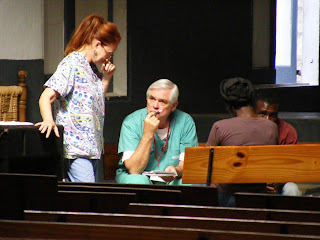This link will take you to a blog that lists some of the harmful outcomes of the short term missions. In the interest of full disclosure to those who may be on the fence as to whether or not they should support this mission, I want to address some of the issues raised here and provide you with examples of the learning process.
 |
| The front of the Hospital located on the Baptist Haiti Mission campus. |
The IHM mission is based out of the well-established Baptist Haiti Mission and primarily functions in villages where satellite churches have already been established. This is crucial in the success and in avoiding common pitfalls in short term medical missions.
How it works:
 |
| Patient intake and pre-registration. |
We travel in a team of five to six medically trained personnel with about as many native translators. We set up shop in already established medical clinics, churches or mission planted schools. The pastors in the area are tasked with informing the locals that we will be there. We usually spend two full days in each village. We set up an initial intake station where blood pressures are taken and medical complaints are recorded with some basic patient demographics.
 |
| Hassan, my friend, translator and soon-to-be medical student discusses a patient's medical history and shares the gospel with a willing listener. |
After this brief interview, the patient waits to see the doctor who completes the assessment and addresses the medical needs that they can with particularly diligent focus on preventative medicine and investigating the sources of medical complaints common to the population we're serving. Our focus is on long term benefit and not just acute complaints (which were very rare).
 |
| Locals wait patiently to be called in to the the doctor in a peaceful and dignified waiting area. |
The name and address of any patient who was interested in the gospel message or accepted Christ was was forwarded on to the local Haitian pastor, who would then follow-up on these souls. We accept that we aren't going to change the world, country, village or even necessarily a single life of a patient in our short stay there, but the lasting results were tangible in that anyone interested was connected with the local church for a relationship to be built and discipling to begin, should they choose.
 |
| Dr. Sorg meets with a patient and Tee, an IHM RN, in a church based clinic. |
The most heartening aspect of this mission is that IHM is very invested in these missions and visits these same towns and villages every couple of months. The follow through pays dividends too. A mutual respect has been developed through these repeated trips into the rural towns and villages and the locals are aware that we have a long term interest in seeing to their needs through the repeated visits.
 |
| Most of our team and our superb paid translators. |
I should also mention that I am not just interested in drumming up support for our trip coming up in November 2011, but also in creating an awareness and long term dedication through our partners in the US and abroad for this important and special ministry. It is of vital importance that you should consider carefully to whom you are donating the Lord's money too. Choose well established, responsible mission organizations with reputable track records.
Above all else, remember the mission teams and especially those they serve in your prayers.
No comments:
Post a Comment